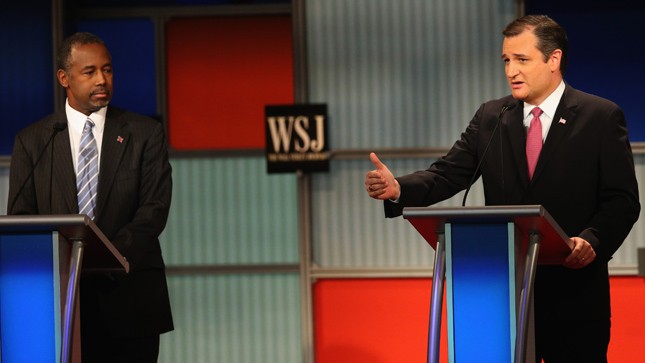
Sen. Ted Cruz (Texas) is rising as Ben Carson falls — especially in Iowa, where the Feb. 1 caucuses are a pivotal test for conservative hopefuls in the 2016 race.
Carson, a retired neurosurgeon with no political experience, had been one of the GOP presidential contest’s two surprising successes, alongside business mogul Donald Trump.
Since briefly swiping the lead away from Trump in the RealClearPolitics (RCP) national polling average in early November, however, Carson has lost about one-fifth of his support in national polls.
Perhaps even worse, Carson has slipped behind Cruz in two recent polls in Iowa, where both men are seen as competing for the evangelical vote, which could also be crucial to victory in South Carolina’s Feb. 20 primary and in a host of other Southern states that will hold contests on March 1.
In Iowa, Cruz claimed 23 percent support in Quinnipiac University’s most recent poll — an 8 percentage point jump from a KBUR poll of Iowa taken exactly one month ago. Carson won 18 percent backing, a 10-point drop.
Cruz also placed second in a recent CBS News/YouGov poll in Iowa, with 21 percent.
The shift is significant enough for some longtime GOP activists in Iowa to believe that Cruz could now be the best-positioned of any candidate to win the caucuses.
“I think Ted Cruz has smartly positioned himself to take advantage of any reduction in support for either Carson or Trump,” said conservative Iowa activist Doug Gross. “With Carson fading and Trump’s support certainly capped, I think he is capturing the bulk of that, and would be the odds-on favorite to win the caucuses.”
Political observers widely agree that Carson has not had a good couple of weeks and that would-be caucusgoers could be drawn to Cruz because he can boast a worldview that is just as conservative as Carson’s.
“Most American presidents hold elective office before they get elected president,” said David Yepsen, who is director of the Paul Simon Public Policy Institute at Southern Illinois University and covered the caucuses for decades as a reporter for The Des Moines Register. “These are caucus activists and they may be conservative, but they are party people. They are pragmatic enough about who they think has a chance to win. ... A lot of them are starting to think with their head, not heart.”
Doubts about Carson’s preparedness to be president have become more acute since the Nov. 13 terrorist attacks in Paris that killed 130 people. The Islamic State in Iraq and Syria (ISIS) claimed responsibility.
In an interview shortly afterward with Chris Wallace of Fox News, Carson struggled to name the nations in the Middle East he would seek to recruit to an anti-ISIS coalition.
Later, when a reporter suggested that he had begun to slip in the polls because voters did not see him as the right would-be commander in chief during a time of increased terrorism, the candidate replied, “I would agree with that assessment. That’s why it’s a good thing it’s a marathon, not a sprint. As time goes on, they will begin to listen more carefully to what I’m saying.”
Carson traveled to Jordan to visit Syrian refugees last weekend and then suggested that he did not discern any great appetite on their part to come to the United States.
“I just think that as people rise in the polls, they get more scrutiny,” said Gross. “In the case of Carson, although there is a lot of affection for him personally, there is increasingly a question about his readiness to assume the job.”
In terms of the dynamics of the GOP race, Cruz has taken care to steer clear of forceful attacks on either Carson or Trump — though he did assert on Monday that Trump was not “gonna be the nominee” of the GOP.
Cruz, who is known to have a fractious relationship with many of his Republican colleagues in the Senate, has positioned himself as an outsider, like the two leading candidates, but one with greater political experience.
The strategy seems to be working.
Republican voters in this cycle “are definitely into wanting a different style of leadership and a 180-degree change of direction,” according to Susan MacManus, a professor of government at the University of South Florida.
Cruz has also tended to the traditional demands of campaigning when it makes sense to do so. Gross noted that the Texan’s campaign has made sustained outreach efforts to Iowa’s Christian pastors and home-schooling advocates, networks that can wield significant power among the Republican grassroots.
The apparent success of his approach burnishes the sense that Cruz has a real and specific strategy to win not just the caucuses but his party’s nomination.
As early as mid-July, Cruz told a group of House conservatives that he had a clear, executable game plan.
“It was a very enlightening discussion about his path to victory,” Rep. Tim Huelskamp (R-Kan.) told The Hill afterward, adding, “It was compelling. He knew his numbers so well.”
- Publish my comments...
- 0 Comments
